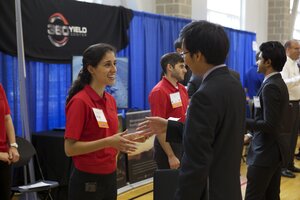By Milena Nutrobkina, Chemical Engineer, 2020-2021 SCS Student Advising Leader
Internships are a great opportunity to better acquaint yourself with a company, network with employers, explore your passions and interests, and develop new skills. Most students strive to intern during their college careers, but it may be a difficult and exhausting process. The University of Illinois provides many resources within the School of Chemical Sciences (SCS) and at Grainger College of Engineering.
This guide is intended for after the career fair has already passed, where you’ve refined your elevator pitch and have followed up with recruiters. I’ll walk you through some of the tips that I’ve gathered throughout internship hunting that may help you as well.
Internship hunting is a long process with many applications. Therefore, some ways to stay organized is using:
- Notion: an organization app where you can do much more than just a tab of jobs you’ve applied to
- Huntr.io: a website to keep track of which jobs you have applied to
- Excel: create a template and keep tabs offline
Once the career fair has passed and you’ve interacted with some employers, it’s important to keep in contact with the recruiters. Ask for their full name and an email to send them a thank you note after you talked with them. This gives them the impression that you’re very serious about the company. LinkedIn is also a great tool to connect with recruiters after the fair and be able to follow their company for recent updates.
Now, you’ve attended the career fair, contacted the recruiters, and now have interviews lined up! This is the exciting part where you get to show your personality and why you’d be the best fit for the role. The ECS has great resources for practice questions. I’ve listed some of the most common ones here:
- Tell me about yourself?
- Tell me about a time you faced a challenge and how did you overcome it?
- Describe a time when you faced a conflict while working on a team or with an individual. How did you handle that?
- Tell me a time when you handled a situation incorrectly.
- Describe a time when your responsibilities got a little overwhelming.
- Describe a time when you took the initiative.
Remember to answer these questions in a STAR format – Situation, Task, Action, Result – and try to be as specific as possible. Ask a couple of questions to the recruiters at the end as well. The questions I typically ask are:
- Who would be my key stakeholders/collaborators for the intern project?
- Are there opportunities for side projects? If so, what is an example?
- What is your favorite thing about the company?
After the interview, make sure to follow up with the people who interviewed you. Mention where you interacted with the person, something specific that happened in your conversation, and that you hope to connect with them soon.
Internship hunting is a daunting process and you shouldn’t be too hard on yourself if you receive several rejections. Many companies don’t start offering internship positions until after the Illinois Career Fairs are over. Continue searching and applying. After several rounds, you’ll be a pro at describing your interests and past experiences to future employers. The SCS Career Services is also here for you if you feel like you’re stumped. They’ve helped me several times with career path guiding and resume reviewing after all my experiences. To contact the SCS Career Services, you can always reach out by phone at 217.333.1051 or email. Virtual and phone appointments can be made through your Handshake @ Illinois account.
Resources:
https://scs.illinois.edu/academics/careers/
https://ecs.engineering.illinois.edu/
https://illinois.joinhandshake.com/schools/364
